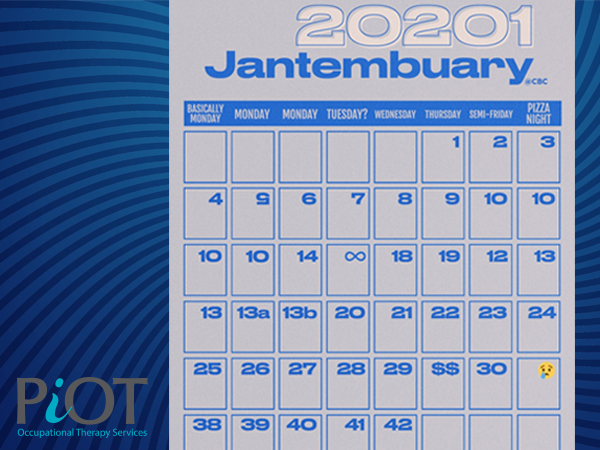
21 Jan Blursday
It’s been a very long year, that 2020. At least it seems that way. For most of us, the perception of the days of the week, time of day, even the seasons, has become altered. Since pandemic restrictions have become commonplace, time seems to drag along. For others, the days pass quickly. Does summer seem long ago to you? Do you even remember last springtime? This distorted perception of time passing has been referred to as “Blursday”, where all the days seem to be the same, and blur into one repeating, generic day.
Time, as an external measure, is constant. It doesn’t change, but according to our activities and emotions, it can feel as though it passes faster or slower than it actually does. For example, a 30 minute period of time seems to pass slowly when you are waiting in a checkout line at the supermarket, but the same 30 minute timespan seems to pass quickly when you are enjoying a fun outing with a friend. Happiness and engaging in activity makes it feel as though time is passing faster, whereas sadness and boredom make it feel as if time is moving slower.
It is interesting to note that in an analysis conducted by Postdoctoral research associate, Matyas Moravec of Durham University, it is suggested that the perceived speed of time during the day was affected by a person’s age, how satisfied they were with their level of social interaction, how stressed they were and how busy they were. 80% of people reported that time felt like it was passing differently with time perceived to be speeding up during lockdown for 40% of people and slowed down for the remaining 40%.
In general, the days passed more quickly for younger people who were socially satisfied, busy and experiencing low levels of stress. Conversely, the day passed more slowly for older people, particularly those over the age of 60, who were socially dissatisfied, stressed and lacking tasks to occupy them. Those who are bored and socially dissatisfied, in the absence of other things to think about, may fill this cognitive gap by increasing their monitoring of time. This increased monitoring will result in time passing more slowly than normal, simply because it makes them more aware of time than normal.
If you were asked to quickly reply to the question ‘What day of the week is it?’, many of you would hesitate and think twice before answering, whereas before pandemic, you would likely immediately be aware of what day of the week it was. The Blursday effect may cause you to not take notice of weekdays and weekends, as the week blends into one repetitive day after another. The signposts we create to structure our week, such as anticipating the weekend for a change of activity and days off of work, or regular midweek dinners with family, and scheduled weekly activities for kids, all create the feeling of time passing. As we look forward to and pass these markers, we are more conscious of what day of the week it is, and what day is coming up. During pandemic, because nothing is happening, we feel disoriented and stuck in the present, as if time is not passing.
Keeping busy, minimising stress, and engaging in as much face-to-face or online social interaction as possible can help to regain our sense of schedule and routine. Rather than dwelling on circumstances beyond our control, channel your energies towards setting some goals. Designate certain times or days of the week to be special, such as a daily 2 pm tea time, or Wednesday Pizza Night. Invent some celebrations even when there is nothing to celebrate. Create some pleasant signposts and markers in your days and weeks to regulate the passage of time. If you have gone off track with your appointments and therapies, this is a good time evaluate your needs and restart a regular pattern. Your occupational therapist or other healthcare provider can help you to re-establish a routine and support your sense of wellbeing. Let’s congratulate ourselves for making it through 2020. Last year, we proved to ourselves just how much resilience and creativity we have. We look forward to 2021 showing us the perseverance within us, and that we can follow through and overcome our restrictions and challenges.

